Formal Interview Thank You Letter
-
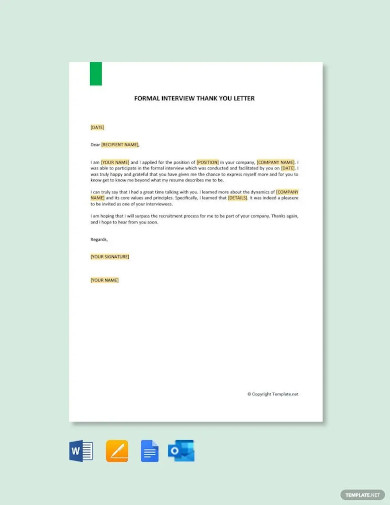
Formal Interview Thank You Letter
download now -
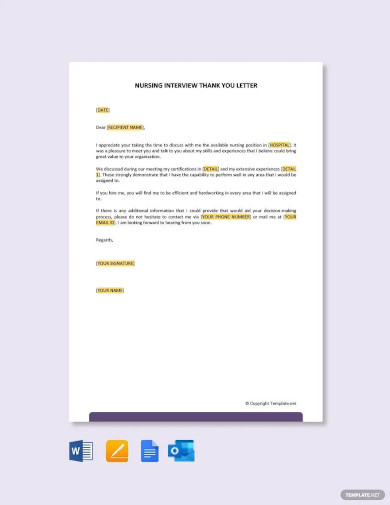
Nursing Interview Thank You Letter
download now -
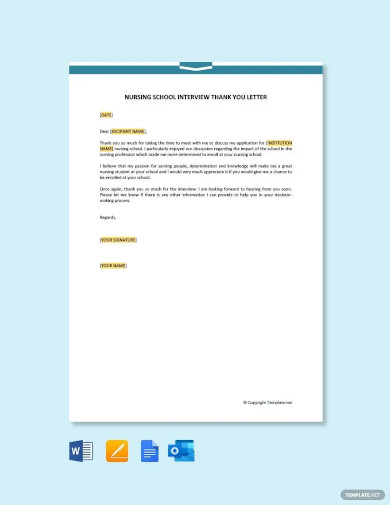
Nursing School Interview Thank You Letter
download now -
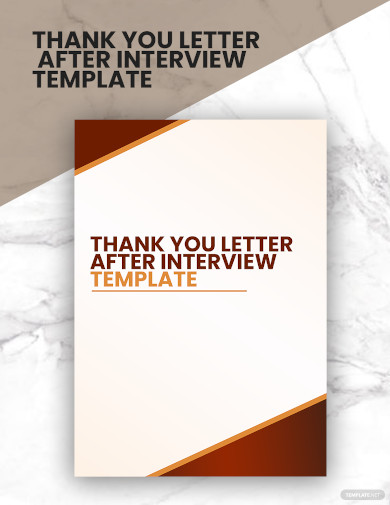
Free Thank You Letter after Interview
download now -
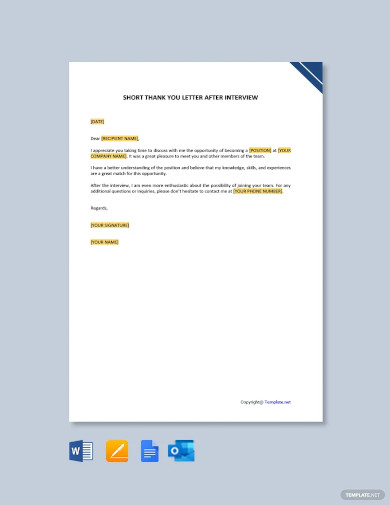
Short Thank You Letter After Interview
download now -
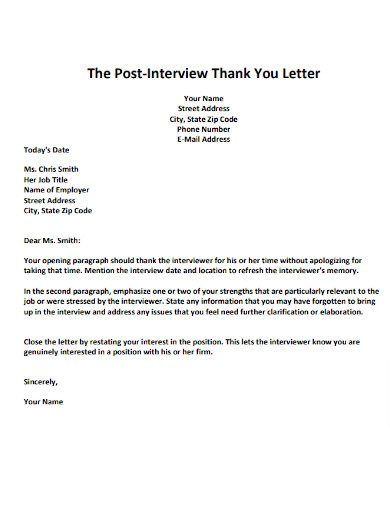
Post Interview Thank You Letter
download now -
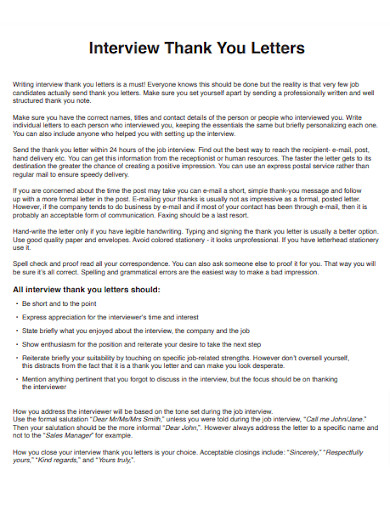
Simple Interview Thank You Letters
download now -
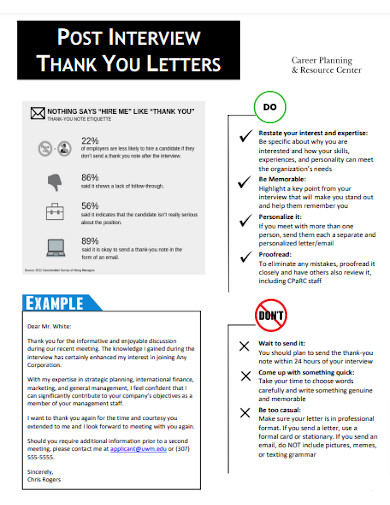
Sample Post Interview Thank You Letter
download now -
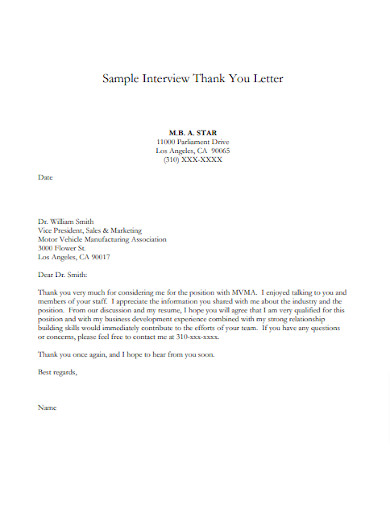
Sample Interview Thank You Letter
download now -
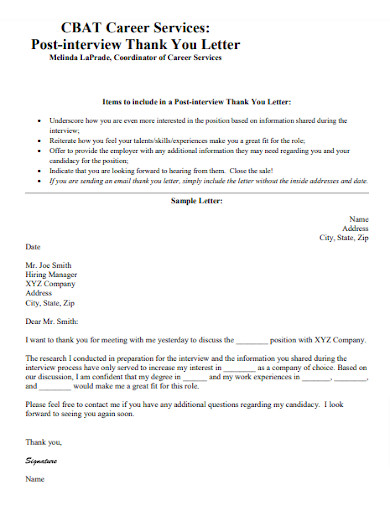
Basic Interview Thank You Letter
download now -
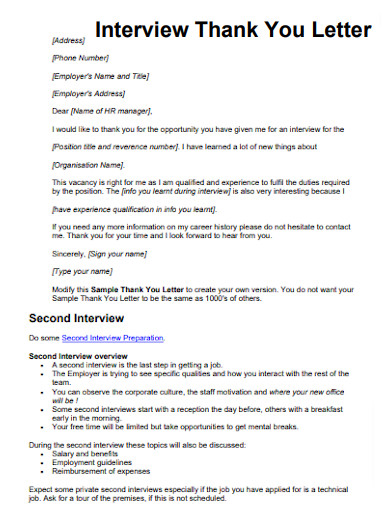
Formal Interview Thank You Letter
download now -
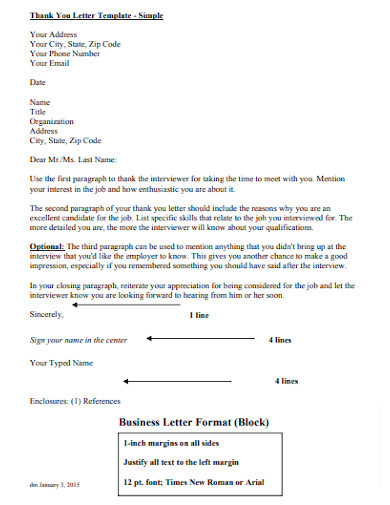
Interview Thank You Letter Format
download now -
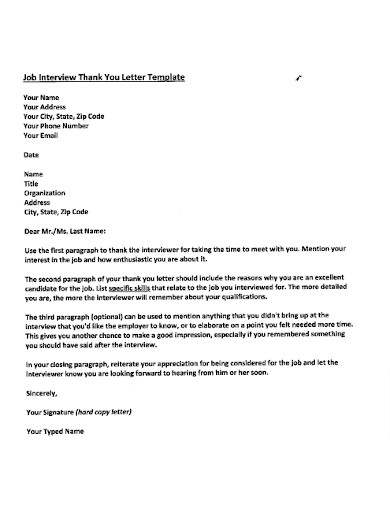
Job Interview Thank You Letter
download now -
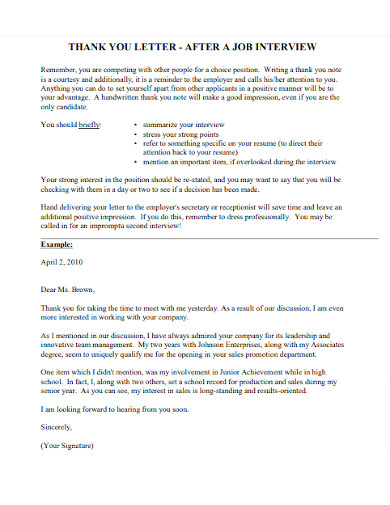
Thank You Letter – After Job Interview
download now -
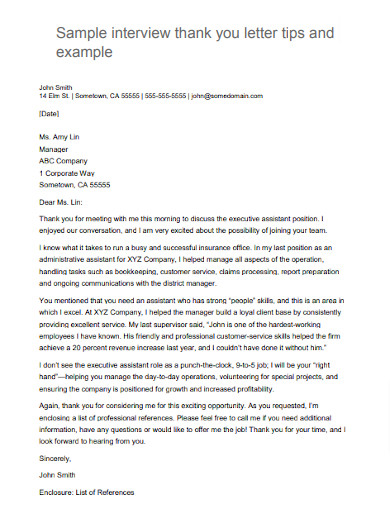
Interview Thank You Letter Tips
download now -
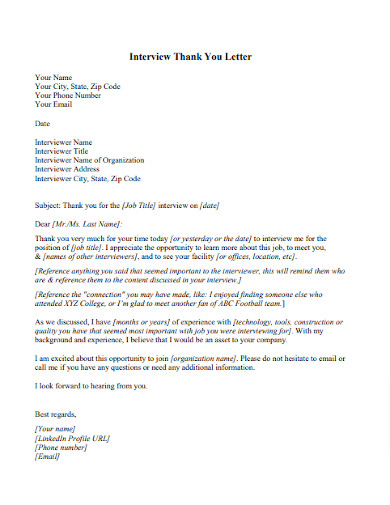
Interview Thank You Letter Outline
download now -
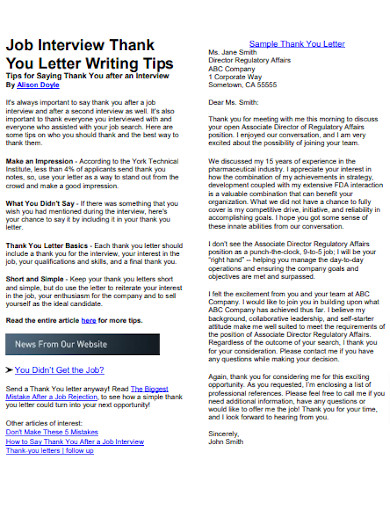
Job Interview Thank You Letter Writing Tips
download now -
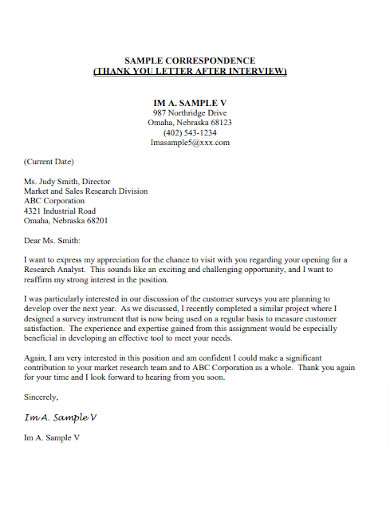
Correspondence Thank You Letter
download now -
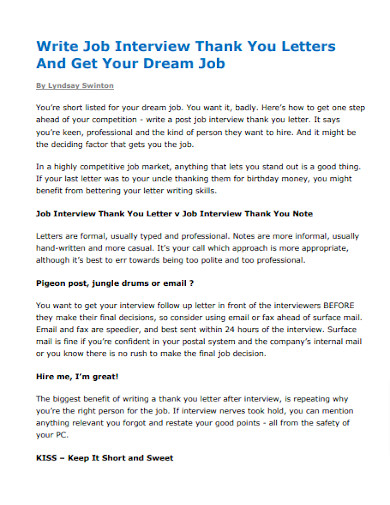
Dream Job Interview Thank You Letters
download now -
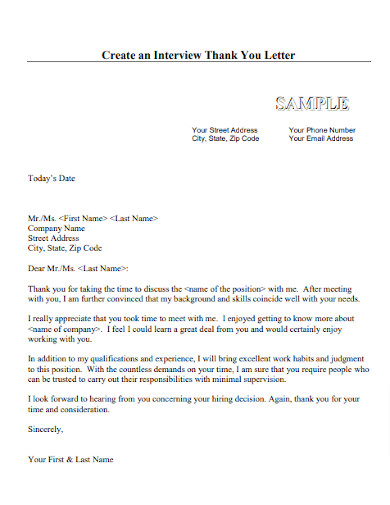
Create an Interview Thank You Letter
download now -
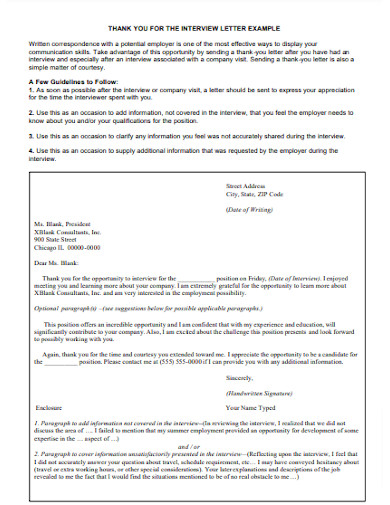
Interview Thank You Letter Layout
download now -
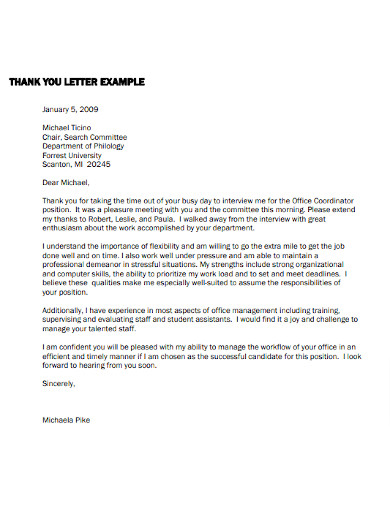
Standard Interview Thank You Letter
download now -
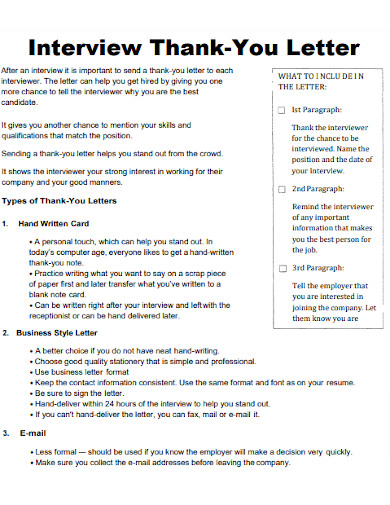
Interview Thank You Letter in PDF
download now
What Is an Interview?
A job interview is a discussion between a prospective employer and a candidate. It is a procedure designed to assist an employer in evaluating a candidate’s skills, personality, character, and domain knowledge. In this formal interview, the employer asks the candidate questions to obtain information. Discussions typically occur during the final phase of the recruitment process and help companies select the best candidate for a position. During an interview, the interrogator may inquire about your salary expectations, while you may inquire about the position’s duties. A second purpose of an interview is to verify the applicant’s resume. Employers use this opportunity to investigate a candidate’s claim and determine whether evidence can support it.
Benefits of an Interview
Interviews are advantageous for employers because they allow them to compare and contrast various job candidates. While a CV and cover letter can provide insight into a candidate’s suitability for a position, meeting candidates in person can reveal more about their attitude, character, and manner of presentation. These elements can assist hiring administrators in making good hiring decisions. Standard interview questions provide employers with a straightforward method for comparing candidates and determining who is the most qualified for the position. Here are some interview advantages:
Types of Job Interviews
When interviewing with multiple companies, preparing for the various types of interviews you may encounter can be beneficial. Depending on the position, an interviewer may use unique queries and formats to learn more about their candidates. Understanding these various interview techniques will help you prepare for each. The following are some categories of job interviews you may encounter during your job search:
1. One-On-One Interview
A traditional one-on-one interview involves meeting with a hiring manager or human resources professional to address questions. This typically occurs with the manager in charge of the position, who wishes to evaluate your potential match on their team. They frequently inquire about your previous work, skills, and approach to situations to determine if your actions and accomplishment reports can assist them in achieving their objectives.
2. Panel Interview
In a panel interview, multiple individuals ask you inquiries. These are typically individuals with varying organizational perspectives, such as human resources, your potential manager, and sometimes team members. They frequently have distinct responsibilities so they may ask you about specific business areas. For instance, a human resources professional may inquire about your salary expectations, while a team member may inquire about your collaboration methods.
3. Distance Interview
Employees may request to meet via phone or video for a distance interview. Typically, these prescreening methods ask you fundamental questions before your traditional interview. This is common for human resources professionals, who may ask several formal inquiries. If you satisfy their expectations, they may schedule an in-person interview to learn more. As numerous companies offer remote employment opportunities, video interviews may supplant traditional discussions for some companies.
4. Behavioral Interview
Traditional interviews may not be as in-depth as behavioral interviews. A recruiting manager may ask you to describe specific situations you encountered in your previous position, including your actions and outcomes. This is common in fields such as technology and science, where they expect to discover how to solve specific problems. These types of interviewers may also inquire about hypothetical scenarios and your responses.
5. Group Interview
Group interviews are 1conducted alongside other candidates for the same or comparable positions. Typically, companies give a concise presentation about their business before interviewing each candidate. They may ask you inquiries in the same room, so this is a chance to demonstrate why you are the ideal candidate. Frequently, hiring managers plan to observe how you interact with others in the group to gauge your interpersonal skills.
How to Compose an Appreciation Letter
There are numerous advantages to sending a thank-you email after an interview. It can demonstrate your appreciation and willingness to interact personally with hiring managers. In addition, sending a thank-you note after an interview can assist you in standing out from other nominees, particularly if you reiterate how you can assist the company in solving a problem or developing new project timeline. If you’re intrigued, here are the steps to writing a letter of appreciation.
1. Be Efficient
Thank you letters, whether thanking an interviewer for a meeting or conveying appreciation for a gift or favor, should be written and delivered within three days of the event. In addition to creating a favorable impression of your decorum and efficiency, your promptness also conveys the sincerity of your message. Take your time with the recommended three-day window. It is preferable to receive expressions of gratitude late rather than never.
2. Choose the Appropriate Format
Determine if the recipient of your letter is a professional or personal connection. If you intend to hand-deliver the letter, letters to professional contacts should be typed and printed on high-quality paper; otherwise, expressing gratitude via email is recommended. If the recipient of your letter is a personal acquaintance, a less formal format may be appropriate. This means to handwrite the letter plainly and legibly on a card or stationery you adore.
3. Write a Greeting
Personal letters to a close friend require more personalized greetings that include the recipient’s first name. The greeting you select will determine the tone of your letter. For this reason, commencing your gratitude message with the proper greeting is essential. Additionally, the body of your letter should begin with a straightforward, concise expression of gratitude. For instance, a professional thank-you note for a business meeting should start with, “Thank you for meeting with me on Tuesday. I enjoyed our conversation very much.” The recipient will be promptly informed of the reason for your letter if you state it.
4. Be Specific
Mention one or two specifics about what you appreciate or are grateful for to illustrate your gratitude. Personalizing the letter in this manner will demonstrate your sincerity. Guarantee that your writing is concise and clear. I particularly enjoyed our conversation about the impact of teaching social outreach in a high school context. Your ideas regarding incorporating community service into the general curriculum were highly insightful. I intend to continue investigating the viability of this idea.” Maintain a genuine tone, or you risk sounding like you are pandering.
5. Conclude and Sign
Reiterate your gratitude and the influence their contribution has had on you. Choose a suitable close and sign your name at the end of the letter. The most common closing for professional letters is “Sincerely,” but “Respectfully” and “Best Regards” are also acceptable alternatives. When delivering a physical letter, it is customary to sign your name by hand, followed by your transcribed name below your signature. Before sending your letter, proofread it thoroughly for grammar, spelling, and typography errors. A letter with errors creates a negative impression and may indicate to the recipient that you rushed while composing it.
FAQs
How to answer an interview?
Clarify your speech and vary your tone to demonstrate interest and zeal. Take time to consider each query to provide a thoughtful response. Listen attentively to questions and allow the interviewer to direct the conversation. If you do not comprehend a query, request an explanation or repetition.
What is a word for thank you very much?
Thank you is a prevalent English expression for expressing gratitude or acknowledging a gift, service, or compliment. Other terms of appreciation include I value you, I cannot thank you enough, and I owe you one.
What is the power of a thankful heart?
Gratitude is the key to a happy existence. It is the key that transforms your situation because it alters you, your perspective, and your attitude. There is strength in a grateful spirit. Thanksgiving provides happiness. A thankful attitude welcomes and embraces God’s will.
An interview thank-you note is an excellent way to express gratitude for the interviewer’s time, and it can distinguish you from other candidates. Just ensure that it is genuine and does not sound generic or insincere. With these helpful tips for sending thank-you emails, you are prepared to ace your interview.
